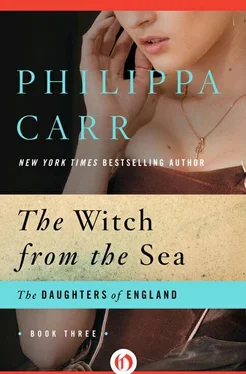And so the time passed.
When I was thirteen years old the Queen died. I was staying with my grandparents at the time. It was March of the year 1603. I remember feeling depressed, not so much because the Queen was dead but because the realization was brought home to me that my grandparents were old and if the Queen who had seemed immortal should die, so could they. My great-grandmother Damask, who was named after the rose, had died at a great age just after my mother had. It was a double blow for my poor grandmother, for although she saw little of her own mother, she being in London, there were the same kind of ties between them as there had been between my mother and hers.
Death was in the air. “’Tis something as don’t come singly,” said Jennet prophetically.
My grandfather, the once lusty sea captain, no longer went to sea. He must have been over seventy years old, for my grandmother was sixty-three. He used to sit on the Hoe for hours looking out to sea, I suppose dreaming of the days of adventure. He walked with a stick because one of his legs was stiffening and gave him a certain amount of pain. He still roared about the house and my grandmother still berated him, but I felt they behaved as they did not because they felt any animosity towards each other but because they wanted to go on as they always had. Uncles Carlos and Jacko were at Lyon Court often when they were not at sea and they would sit with their father and talk of their latest exploits. They were devoted to him. Edwina was often at Lyon Court too; and her sons with her. Damask was going to marry one of the captains in the Trading Company. It was with a certain sadness that I realized how everything was changing—a little here, a little there, until the entire picture was different.
On the day the Queen died we sat at table in the great hall because there were guests in the house. There were the parents of the young man Damask was to marry and he was there too, and there were several others who worked for the Trading Company.
The talk was naturally all of the Queen: what a great reign it had been and that her death was sure to mean changes. She had been ailing for some time and we should have been prepared, but we had all thought she would continue to reign over us for ever. All my life people had talked of the Queen as they might have talked of the Earth. It was impossible to imagine England without her.
My grandfather adored her. To him she was the symbol of England. She had once sent for him to go to London and he had sailed up the Thames and had gone to Greenwich where she most graciously received him. It was before the defeat of the Armada and she had been fully aware of how useful men such as Jake Pennlyon could be to her. She had complimented him on his exploits and had hinted that she looked to him to go on robbing Spaniards of their treasure and bringing it home and making sure that a goodly proportion of it made its way into the nation’s purse, while at the same time she let the Spaniards believe that she was admonishing her pirate seamen. That had appealed to my grandfather. He had constantly declared he would serve her with his life.
Now she was dead. That proud spirit was no more. We had always listened avidly to the stories about her; how she was so vain that with her painted cheeks and wigs she had believed the courtiers who had told her she was the most beautiful woman on earth (had she really, or had she appeared to in order to attempt to convince them that she was?); how she had loved the Earl of Essex yet had agreed to his execution; how right to the very end she had expected men to fall in love with her and thought them traitors if they did not, how furious she had always been when they married or took mistresses although she had no intention of giving up one small bit of her sovereignty by marriage; how she had three hundred dresses in her wardrobe, how choleric she was, how calm and shrewd, how cruel, how kind she could be. Whatever she was, she was a great Queen.
“We shall never see her like again,” mourned my grandfather.
She had gone to Richmond when she had become so ill, for she believed the quiet and the air would help her to recover; for a while she had seemed better there but then she had fallen into a state of stupor. She had had a notion that if she went to bed she would never rise again so she commanded her servants to bring cushions and she lay on them on the floor.
Captain Stacy, the father of Damask’s betrothed, had recently come from London and he had special information. He had heard from some present at the time that she had named her successor. She had said to Cecil, her Secretary of State: “My seat has been the seat of Kings and I shall have no rascal to succeed me.”
“By rascal,” said Captain Stacy, “Her Majesty meant none who was not a King, for she went on: ‘Who should succeed me but a King.’”
“She was referring to King James of Scotland, the son of her old enemy the Queen of Scots,” said my grandmother. “I doubt not that is a most excellent choice for he is indeed the true heir.”
“And a good Protestant,” said my grandfather, “in spite of his Papist mother.”
So died our great Queen, she was seventy years of age and had reigned for forty-five years.
We had a new monarch. King James I who had been the James VI of Scotland.
“I wish my mother had lived to see this day,” said my grandmother. “This union between England and Scotland is bound to bring peace. Peace was what she wanted all her life—and although she came to find it in her own household, all through her life there was conflict throughout the country—religious conflict.”
“Do you think that is over now, Grandmother?” I asked.
She looked at me and a sad look came into her eyes.
She shook her head slowly.
There was a great deal of talk about our new King and Queen. At the beginning of a new reign everyone was full of hope. They believed that the old evils would disappear and be replaced by blessings. The news we heard regarding our new King was mixed. He was said to be very clever and wise—and was known as the British Solomon; it was believed that the harsh laws against Catholics would be modified. After all, had not his mother been one of the greatest Catholics of them all? We had to learn what manner of King we had but when he came to England with his Queen there was a great revival of the scare of witches.
Although it had happened some thirteen years before when the King’s Queen, Anne of Denmark, had come to England from her native land, the story was recalled.
She had been married by proxy to King James of Scotland (as he was then) and a great fleet had been prepared to take her to her husband. In September of the year 1589 she set out with the Earl Marshal and eleven ships to accompany her. As they neared the coast of Scotland such a storm arose that they could make no progress against it and were very soon in danger of drowning. There was nothing to be done but to allow themselves to be blown on to the coast of Norway. Oddly enough, although they waited there until the storms had abated, when they set out again, no sooner had they sighted the coast of Scotland than the storms arose once more and drove them back.
Peter Munch, the Danish admiral, had no doubt that the repetition of this disaster was due to witchcraft. He took Queen Anne back to Denmark and there began to cast about in his mind for anyone who might bear him a grudge. There were several people he suspected. As these were men and witchcraft was usually attributed to women, he arrested the wives of these men, put them to such torture that they broke down and confessed and they were then burned alive.
The party then set out once again for Scotland, and again no sooner had the coast of the Queen’s new country been sighted than the storms blew up again and they were driven back to Norway. By this time winter had set in and the admiral dared not undertake the journey yet a fourth time.
Читать дальше












